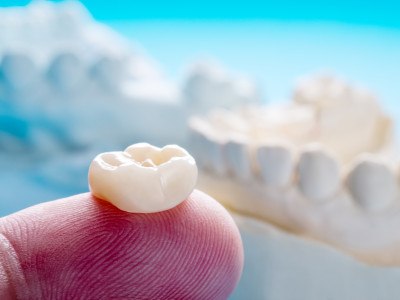
Dental Crowns - Fort Worth, TX
Recovering Teeth After Damage and Loss
At Summer Creek Dentistry, we believe restorative dentistry services should fully restore every aspect of damaged smiles – the form, function, and appearance. The most commonly used restorative solutions are dental crowns. In the past, crowns were crafted from a number of materials including gold and porcelain bonded to metal, but these materials were not able to fully renew the damaged appearance of patients’ smiles. That’s why our dentist, Dr. Jasmine King, uses the highest quality ceramic material to craft custom dental crowns in Fort Worth, TX to fully repair even extensive damage.

Why Choose Summer Creek Dentistry for Dental Crowns?
- Restorations That Are Completely Metal Free
- Dentist with More Than 10 Years of Experience
- Compassionate Dental Team
What Are Dental Crowns?

A dental crown, sometimes referred to as a cap, is a restoration that fits over the top of damaged teeth in order to replace dental structure lost to decay, trauma, or wear. Custom crafted to renew optimal oral health, dental crowns allow our team to preserve dental structure while repairing form and function. We believe in conservative treatment, which means we select services that preserve the maximum amount of healthy tissue while fully repairing the damage. We only recommend dental crown restoration if more conservative solutions would be ineffective.
Traditionally, dental crowns were crafted from gold or porcelain coated metal. Gold crowns offer the most durable solution with the least amount of wear to opposing teeth. Porcelain bonded to metal restorations offer improved appearance, but they wear away the enamel on opposing teeth more quickly. Additionally, as the porcelain wears away over time, the dark-colored metal is revealed below. To avoid these disadvantages, our team uses all-ceramic dental crowns. This high-quality restorative material provides optimal durability and flawless cosmetic appearance. Even as ceramic is worn away over time, these crowns retain their natural appearance, blending seamlessly into smiles.
The Dental Crown Process

Patients in need of restoration with a dental crown should plan to visit our dental office at least two times. The entire process may take anywhere from a few weeks to a month. During the initial preparation appointment, we remove a small amount of healthy dental structure to accommodate the crown placement. In some cases, we may need to perform a crown lengthening procedure to remove a small amount of gum tissue, exposing enough dental structure to support the crown. Next, we capture impressions of the prepared tooth that are used by our dental lab to craft the restoration, and we place a temporary crown to protect the tooth until the final restoration is completed. When we receive the custom crown, the patient returns to our dental office to exchange their temporary for the final dental crown.
Reasons to Get a Dental Crown

Patients may need dental crown restoration in a number of situations including:
- To restore severe decay or damage that cannot be repaired with more conservative services.
- To conceal significant cosmetic flaws.
- To protect the treated tooth following root canal therapy.
- To attach to a dental implant and replace a single missing tooth.
- To support a fixed bridge by attaching to healthy teeth, replacing one to three consecutive missing teeth.
Understanding the Cost of Dental Crowns

If you require more advanced restorative care than a filling, you may also be concerned about how much more this treatment will cost. Our all-ceramic crowns can vary in pricing, depending on several factors and your insurance plan, but regardless of the situation, we are willing to work with you and agree upon an arrangement for payment. Don’t let any worries about the cost keep you from care you and your smile need. We can determine the cost and discuss your financial options during your appointment in person.
Factors That Affect the Cost of Dental Crowns

When we calculate the cost of dental crowns, we consider several things. For instance, the type and location of the tooth being treated contributes to the pricing. Back molars require a larger and more robust crown to handle chewing and grinding your food. More visible front teeth need to look more natural, which means they can take longer to craft in the lab. If you’re curious how the cost is determined, we can explain in further detail, but we won’t know the price until we’ve had the chance to examine you and identify your needs.
Does Dental Insurance Cover Dental Crowns?

Although dental insurance companies—and even plans from the same company—can differ from each other, they generally pay for part of the cost of dental crowns. In fact, the typical coverage for dental crowns is about half of the total price, meaning that you’ll only pay 50 percent of the cost of your restoration out-of-pocket. Our front desk team can confirm your plan’s coverage and let you know how much insurance will cover and how much you’ll owe.
Options for Making Dental Crowns Affordable

Insurance isn’t the only way to take the edge off the cost of crowns. Whether you have dental insurance benefits or not, you may find that paying your bill in full upfront puts your finances in a pinch. Or perhaps you simply want to spread out the total into smaller monthly payments to feel more comfortable. In any case, we accept payment through CareCredit, a third-party financing company that is trusted nationwide. We can help you apply for low-interest financing and make your monthly payments more doable within any budget.
Dental Crowns FAQs

Dental crowns in Fort Worth have been a trusted solution in dentistry for decades. However, a crown is a lifelong commitment. Don’t worry if you have a few concerns. Dr. Jasmine King will explain everything during your consultation. While you wait for your appointment, you can contact our office or take a look at the answers to the most frequently asked questions below.
Are Dental Crowns Permanent?
Dental crowns aren't permanent because they need to be replaced periodically. However, they aren’t reversible because your dentist must reshape your tooth to allow the customized cap to be bonded over it. Your tooth must always be covered by a crown or it will be vulnerable to damage. Thankfully, you don't have to worry about replacements often.
Does Getting a Dental Crown Hurt?
You don't have to stress about a painful procedure. Your dentist in Fort Worth will keep your comfort as their top priority. They may use a local numbing agent when reshaping your tooth. At most, you may feel some pressure or sensations, but the procedure won't hurt. After any numbing medications wear off, your mouth might be tender for a couple of days. Eat soft foods and take an OTC pain reliever to manage any discomfort.
How Long Does a Dental Crown Last?
A dental crown provides a long-lasting solution with the right care. The average lifespan of a crown is about 10 years, but many factors will affect the duration of your results, like the materials used. You can get the most from your restoration by brushing, flossing, and visiting your dentist regularly. Limit your consumption of sugars and starches to prevent decay. Moderate hard or sticky foods to avoid wear and tear. Ask your dentist for a nightguard if you grind or clench your teeth.
Can Dental Crowns Get Cavities?
Your crown can’t get cavities. However, your surrounding teeth and underlying tooth are still vulnerable to cavities. Poor oral hygiene can cause plaque to build where your crown meets your gum line. Bacteria can gain access to your tooth through small cracks that form in the dental cement over time. You can keep tooth decay at bay by brushing your teeth twice daily and flossing every day. Moderate your consumption of sugary foods and drinks.
Does Teeth Whitening Work on Dental Crowns?
Dental crowns are made of all-ceramic materials, so they shouldn’t discolor. However, damage to restorations can make them look stained. Not to mention, your surrounding teeth can still change color. Unfortunately, whitening treatments won’t have any effect on the color of your crown, despite improving your natural teeth. You should avoid whitening products because they can damage your restoration over time. Your cosmetic dentist can create a personalized solution to treat discoloration without harming your crown.
I Need a Checkup & Cleaning I am Looking for a Dentist for My Child I am Concerned About Bleeding Gums I Have a Cavity or Broken Tooth I am Missing One or More Teeth I am Unhappy with My Smile I Need a Straighter Smile I am Scared of the Dentist I am in Pain & Need Help View Our Services